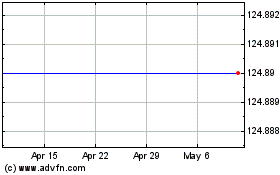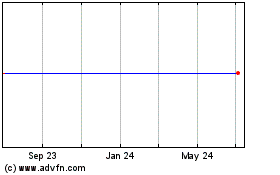With Mellanox deal, chip maker seeks to bolster its position in
cloud computing
By Asa Fitch
This article is being republished as part of our daily
reproduction of WSJ.com articles that also appeared in the U.S.
print edition of The Wall Street Journal (March 12, 2019).
Nvidia Corp. agreed to acquire networking firm Mellanox
Technologies Ltd. for about $6.9 billion, its largest deal by far
as it bolsters its bet on cloud computing after suffering a
stinging drop in its core graphics-chips business late last
year.
The combination, announced Monday, marks the latest foray by
Nvidia beyond chips known as graphics processing units. While
Nvidia has pushed into artificial-intelligence applications and
grown its data-center business in recent years, much of its growth
has been rooted in finding new uses for its chips rather than
venturing into entirely new areas.
With Mellanox, Nvidia is buying a maker of Ethernet switches and
adapters that connect computers to each other, wiring together
networks where users can rapidly exchange information. The company
is a major supplier of equipment that conforms to the so-called
InfiniBand networking standard widely used in supercomputers.
Nvidia's acquisitions outside the graphics-chip arena have been
few, and none of its deals are in the same financial orbit as
Mellanox's. It paid $367 million in 2011 for the modem-technology
company Icera, its largest disclosed acquisition before the
Mellanox deal, a spokesman said. Nvidia wound down that business in
2015.
"We rarely do deals, and the reason is on balance we really
prefer to build" new businesses, Nvidia Chief Executive Jensen
Huang said in an interview.
Nvidia, based in Santa Clara, Calif., will pay $125 a share in
cash for Mellanox, a 14% premium to the company's closing price
Friday of $109.38.
Shares of Nvidia, which have been battered in recent months,
rose 7% to $161.14 on Monday. Mellanox shares rose 7.8% to
$117.89.
The transaction, expected to close by end of 2019, would
immediately add to Nvidia's gross margin and bottom line once
completed, the company said. On a call with analysts, finance chief
Colette Kress said Nvidia doesn't expect to change its plans to
return $2.3 billion to shareholders in the current fiscal year on
top of what it already has done.
Nvidia's chips, long designed to enable advanced graphics for
videogames, have proven well-suited to difficult computing tasks,
and are widely used in high-performance computing and cloud
infrastructure by companies such as Amazon.com Inc. and Alphabet
Inc.'s Google.
The rise of cryptocurrency mining and artificial-intelligence
applications that also made heavy use of Nvidia's chips propelled
the company's sales in recent years and sent its stock price
soaring.
But Nvidia suffered a reversal last year, in large part because
cryptocurrency prices fell sharply and mining became
unprofitable.
Mr. Huang had called Nvidia's most recent quarter "a real punch
in the gut" after revising quarterly revenue guidance downward by
$500 million due to slow sales of its latest graphics chips for
videogames and the hangover from the cryptocurrency bust. The
company's shares fell from almost $290 in October to around $151 at
Friday's close.
The Mellanox acquisition likely will add modestly to Nvidia's
profit and could be a good strategic fit, according to Bernstein
Research analyst Stacy Rasgon, though he said some investors might
scratch their heads about the timing of the deal.
"It's not uncommon from growth companies that hit headwinds to
start buying stuff, and people wonder: Is the view on the core
business changing?" he said.
Mr. Huang said the deal meshed with Nvidia's view that the
future is about constructing a fast, interconnected fabric of
computing power in data centers. "We have some short-term
challenges that are largely behind us," he said. "Our investment
thesis -- our company's thesis -- remains intact."
Mellanox, which has operations in the U.S. and Israel, has been
up for sale since last year, according to a person familiar with
the matter. Its market capitalization was around $5.9 billion as of
Friday's close.
The deal is among the largest involving an Israeli company,
valued at slightly less than International Flavor & Fragrances
Inc.'s acquisition last year of Frutarom for $7.1 billion including
debt. Intel Corp. in 2017 signed a $15.3 billion deal to buy the
car-camera pioneer Mobileye NV.
Israel has been trying to position itself as a major producer of
tech related to artificial intelligence. The country had 1,150
AI-related companies at the end of 2018, up from 512 in 2014,
according to Start-Up Nation Central, a Tel Aviv-based nonprofit.
Nvidia opened a research and development center in Israel in
October.
Mellanox reported $1.09 billion in revenue last year, compared
with Nvidia's sales of $11.72 billion in its fiscal year ended Jan.
27. Nvidia employs around 13,000 people, according to its most
recent financial report, about five times as many as Mellanox.
Felicia Schwartz and Kimberly Chin contributed to this
article.
Write to Asa Fitch at asa.fitch@wsj.com
(END) Dow Jones Newswires
March 12, 2019 02:47 ET (06:47 GMT)
Copyright (c) 2019 Dow Jones & Company, Inc.
Mellanox Technologies (NASDAQ:MLNX)
Historical Stock Chart
From Mar 2024 to Apr 2024

Mellanox Technologies (NASDAQ:MLNX)
Historical Stock Chart
From Apr 2023 to Apr 2024
